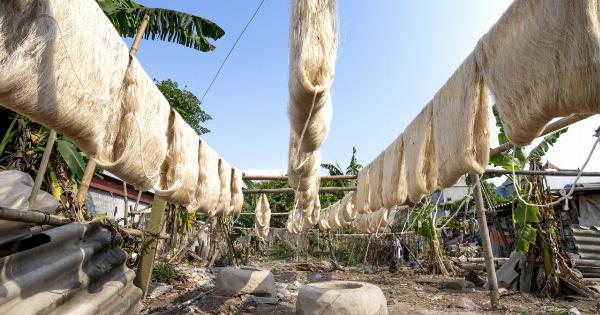Fiber is an essential nutrient that plays a crucial role in maintaining good health. It is a type of carbohydrate that cannot be digested by the body, thus passing through the digestive system relatively intact.
Despite its inability to provide energy, fiber offers numerous health benefits, including promoting bowel regularity, preventing constipation, and maintaining a healthy weight. Unfortunately, many individuals do not consume an adequate amount of fiber, leading to various health problems.
In this article, we will explore how insufficient fiber intake can impact your health and highlight the importance of incorporating fiber-rich foods into your diet.
The Role of Fiber in Digestion
Fiber acts as a natural bulking agent that adds volume to the diet, aiding digestion and preventing constipation. When consumed, it absorbs water in the digestive tract, softening the stool and facilitating its passage.
Insufficient fiber intake often leads to sluggish bowel movements, increasing the risk of constipation. Over time, chronic constipation can cause discomfort, bloating, and even hemorrhoids. By incorporating enough fiber into your diet, you can maintain regular bowel movements and promote overall digestive health.
Weight Management and Fiber
Fiber-rich foods are often low in calories while providing a sense of fullness and satisfaction. When consumed, fiber takes longer to pass through the digestive system, which can help control appetite and prevent overeating.
By incorporating adequate amounts of fiber into your meals, you can enhance weight management efforts and reduce the risk of obesity. Furthermore, high-fiber foods require more chewing, promoting a slower eating pace and allowing the brain to register fullness more accurately, ultimately leading to better portion control.
Fiber and Heart Health
Consuming sufficient amounts of dietary fiber has been linked to numerous cardiovascular benefits. Soluble fiber, found in foods such as oats, barley, and legumes, can help reduce cholesterol levels, specifically LDL cholesterol.
High levels of LDL cholesterol have been associated with an increased risk of heart disease and stroke. Therefore, incorporating soluble fiber into your diet can aid in maintaining healthy cholesterol levels and support heart health.
In addition, fiber-rich foods are typically low in saturated fat and cholesterol, making them excellent substitutes for high-fat, highly processed options.
By replacing unhealthy choices with fiber-rich alternatives, you can further improve heart health and reduce the risk of cardiovascular diseases.
Dietary Fiber and Blood Sugar Control
Fiber plays a significant role in managing blood sugar levels, making it particularly important for individuals with diabetes or those at risk of developing the disease.
Soluble fiber can slow down the absorption of glucose in the bloodstream, preventing spikes in blood sugar levels after a meal. This effect is critical in managing diabetes and can also help prevent prediabetes from progressing to full-blown type 2 diabetes.
Incorporating high-fiber foods into your diet can be beneficial for individuals without diabetes as well.
By keeping blood sugar levels stable, fiber-rich meals can help prevent energy crashes, mood swings, and cravings, ensuring overall well-being and sustained energy throughout the day.
Effects of Insufficient Fiber Intake
When fiber intake is consistently lacking, various health problems can arise. One of the most common issues is chronic constipation.
As mentioned earlier, a lack of fiber can lead to infrequent bowel movements and difficulties passing stool, causing discomfort and bloating.
Furthermore, insufficient fiber intake can increase the risk of developing diverticulosis or diverticulitis. Diverticulosis refers to the formation of small pouches, called diverticula, in the colon wall.
When these diverticula become inflamed or infected, it results in diverticulitis, a condition that can cause severe abdominal pain, fever, and digestive issues. A fiber-deficient diet contributes to diverticulosis by weakening the colon walls and making the formation of diverticula more likely.
Other potential consequences of insufficient fiber intake include elevated cholesterol levels, increased blood sugar fluctuations, and a higher likelihood of overeating and weight gain.
Without an adequate intake of fiber, the body misses out on vital health benefits, which can have long-term consequences for overall wellbeing.
How to Incorporate More Fiber into Your Diet
Boosting fiber intake is easier than you might think. By making simple adjustments to your eating habits, you can ensure you meet your body’s fiber needs and reap the associated health benefits.
Start by gradually increasing your consumption of whole grains. Opt for whole grain bread, pasta, and rice, which contain more fiber and nutrients than their refined counterparts.
Swap white bread for whole grain bread and white rice for brown rice to increase your daily fiber intake significantly.
Another easy way to incorporate more fiber is to increase your intake of fruits and vegetables. These nutritious foods are naturally high in fiber, in addition to providing essential vitamins and minerals.
Try to include a variety of colorful fruits and vegetables in your meals. Snack on raw veggies with hummus or add fruits like berries and sliced bananas to your breakfast cereal or yogurt for an extra fiber boost.
Legumes, such as beans, lentils, and chickpeas, are also excellent sources of fiber. They are versatile, inexpensive, and can be added to soups, stews, and salads to create nutritious and fiber-packed meals.
If you’re not accustomed to consuming legumes regularly, start by gradually incorporating them into your diet to prevent potential digestive discomfort.
Lastly, nuts and seeds are another fantastic way to increase your fiber intake. They can be eaten as a snack or used in various recipes, such as salads, stir-fries, or homemade granola.
Remember to choose unsalted options to avoid consuming excessive sodium.
Conclusion
Fiber is an essential nutrient that plays a significant role in maintaining good health. From promoting digestion to aiding weight management, fiber offers a range of benefits.
Insufficient fiber intake can lead to various health issues, including constipation, diverticulitis, high cholesterol levels, and blood sugar imbalances. By incorporating fiber-rich foods into your diet, you can support optimal digestion, heart health, blood sugar control, and overall well-being.
Start making small changes to increase your fiber intake, and enjoy the long-term benefits of a fiber-rich diet.






























